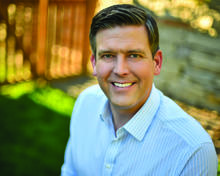After reporting and anchoring around the country, Raguse came back home to KARE-11 and is now a published author.
When Lou Raguse (B.A. ’04) was in high school in Wheaton, Minn., he was more likely to say he wanted to be an author or a comedy writer on a show like Seinfeld than a journalist. He was always creative, participating in the school play and on the speech team, developing a love for current events through his social studies class, and taking over the school newspaper with a buddy.
Because he also loved sports, Raguse came to the University of Minnesota thinking he might study to be a sports anchor, like those on ESPN. But one journalism course with the late, great Paul McEnroe hooked him, and broadcast courses with Ken Stone sealed the deal. He was meant to be a journalist.
“There were so many good print journalists teaching at the U,” he said. “My whole life I wanted to set myself apart from the crowd, and the creativity aspect of being a journalist really stood out to me.”
His notoriety started before even leaving the U; he earned student Emmys and other awards. His senior year, Raguse was nominated for a William Hearst Journalism Award and was invited to San Francisco for the championship competition. He had just two days to traipse the city and gather the information to film, write and edit two different stories. He took home first place.
After graduation, Raguse worked as a reporter in Sioux Falls, S.D., reported and anchored in Tucson, Ariz., and reported and anchored in Buffalo, N.Y., before returning to Minnesota and joining KARE-11 in 2015. Over the years, he’s covered huge stories, including the Daphne Wright trial, the attempted assassination of Congresswoman Gabby Giffords, the kidnapping of Jayme Closs, and the trials of the officers charged with killing George Floyd.
When getting his start in South Dakota, Raguse said he had the choice between covering ‘cops and courts’ or the education beat. “I knew if I did the cops and courts, I would have more lead stories,” he said. “I became an expert on court cases and crime and I brought that expertise to other markets.”
Many of the huge stories he’s covered in his nearly 20-year career have not been easy, and perhaps even traumatic, and doing that day in and day out can take a toll. Raguse gets inspiration from his long-time idol, Boyd Huppert, who is nationally recognized for his thoughtful, engaging storytelling, and he’s learned that being stoic or unfeeling while covering traumatic events is doing himself and his subjects a disservice.
“I’ve probably given more hugs than other reporters,” he said. “You’re an unbiased reporter but that doesn’t mean you can’t be a trusted shoulder. Something that is universally sad is sad and that’s not biased. I’m able to carry the emotion I experience into the story and that makes my reporting better, by being more human.”
It could be his empathy that has made Raguse become an authority of sorts on cold cases, producing several stories for a KARE-11 “Minnesota Unsolved” series and, most recently, writing his first book, “Vanished in Vermillion: The Real Story of South Dakota’s Most Infamous Cold Case.” When he worked in South Dakota, he covered the cold case of two 17-year-old girls who disappeared in the spring of 1971 and was leaving many questions unanswered. The case was finally solved in 2013. Once there was a resolution, Raguse could see the potential for a book. He did research in his spare time, traveling back and forth to South Dakota (made easier since his in-laws live there). The book was published this past February.
His hometown of Wheaton has its very own cold case, about a man who was found dead in a river. And while Raguse has covered the story for KARE-11, and thinks it’s possible it could make a good book, it remains unsolved. “It’s hard to read about hard things without the mystery, or intrigue,” he said. “But to write a book about it, I strongly feel there does have to be an ending.”
For Raguse, the plan is to continue to cover the cops and courts beat, give a voice to the victims of cold cases as long as KARE will let him, and even write another book. “I hope to remain in Minnesota. I love reporting here.”
Interview by Amanda Fretheim Gates
